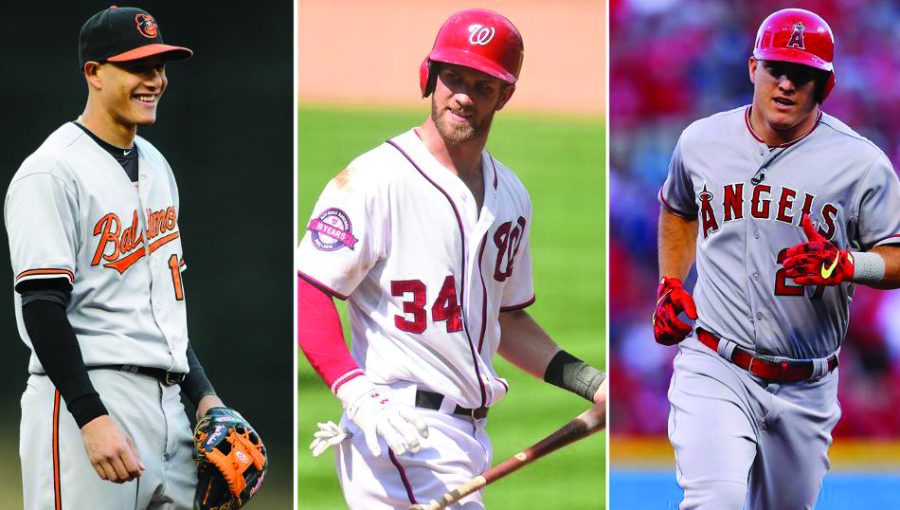Harper, Trout and Machado: Were they worth it?
Half a billion, no playoffs
October 8, 2019
These days, professional sports are a star-driven business and Major League Baseball is no exception. In order to win, it helps to have a star or two on your team who excel at their craft. However, overpaying one star player can hinder a team’s ability to construct a championship-caliber roster. Why? Because if one player monopolizes the salary cap, it adversely affects a team’s ability to recruit a capable supporting cast
If one were to look at three of the highest paid players in baseball and where their teams are positioned in the standings, one might detect a pattern. First, we look at the Los Angeles Angels, who recently signed outfielder Mike Trout to a 12-year contract worth nearly $430 million. This year, the Angels finished the season with a record of 72-90, good for fourth in the five-team AL West. In fact, during Trout’s nine-year MLB tenure, the Angels have only qualified for the playoffs once. Trout has never advanced beyond the first round.
Next we look at the San Diego Padres, who this past offseason signed third baseman Manny Machado to a 10-year contract worth $300 million. Like the Angels, the Padres finished fourth in their division and failed to qualify for the playoffs. Since debuting in 2012, Machado has made the playoffs four times. However, Machado was a beneficiary of a stronger supporting cast, a luxury afforded to the Orioles (and later Dodgers) by Machado playing under a more modest contract.
Finally, we look at the Philadelphia Phillies, who in the offseason signed outfielder Bryce Harper to a 13-year contract worth around $330 million. Between Trout, Harper and Machado, Harper plays for the best team. Nevertheless, the Phillies failed to reach the MLB playoffs. Ironically, Harper’s former team, the Washington Nationals, clinched a playoff spot by defeating the Phillies, subsequently knocking the Phillies out of playoff contention. With the season ending, the six highest-paid position players in baseball (Harper, Trout, Machado, Cespedes, Pujols and Cabrera) will all miss the playoffs.
Teams tend to overvalue the impact of superstar players. We can once again point to Trout, Machado and Harper as examples. In his nine-year career, Trout has only surpassed the 100 RBI mark three times. Harper has hit for 100 RBIs twice in seven seasons while Machado has reached that milestone just once.
Collectively, their lack of postseason results indicates that regular season success does not necessarily translate to the postseason. Neither Trout or Harper have ever advanced beyond the first round. Machado’s lone World Series appearance was a byproduct of a late season trade that saw him traded to the Los Angeles Dodgers, who were already considered to be World Series frontrunners at the time. However, the Dodgers viewed Machado as a rental player, as evidenced by the team’s decision to not extend an offer comparable to that of the San Diego Padres. Furthermore, despite Machado’s departure, the Dodgers earned the best record in the National League .
Offering these players mega contracts simply has not produced on-field results. For the sake of contrast, let’s take a look at what the Atlanta Braves have done. This offseason, the Braves proactively signed Ronald Acuna Jr., 22, and Ozzie Albies, 22, to cap friendly extensions. Acuna’s contract will see him paid $100 million over eight years. The Braves then signed Albies to a 7-year, $35 million deal. Additionally, Atlanta signed outfielder Nick Markakis (one-year, $6 million), third baseman Josh Donaldson (one-year, $23 million), first baseman Freddie Freeman (8-year, $121 million) and shortstop Dansby Swanson plays under a meager (one-year, $585 thousand) to manageable contracts. The Braves spent $35 million less on six quality players than the Phillies spent on Bryce Harper. As a result, the Braves finished with the second best record in the National League while the Phillies missed the playoffs entirely.
General managers should learn from the mistakes of their predecessors. Spending an actual fortune on one superstar player severely hampers a franchise’s ability to construct a solid supporting cast. On the other hand, by spending more prudently, teams may acquire more talent by allocating cap space evenly throughout their roster. The choice seems pretty obvious, doesn’t it? But when the pitch is on the way, some teams buckle at the knees.









